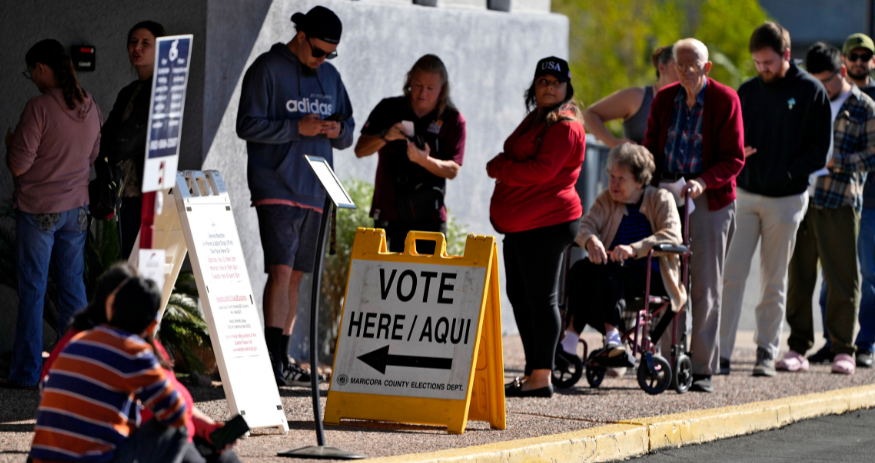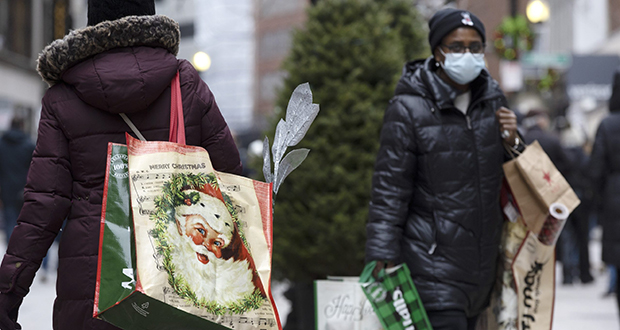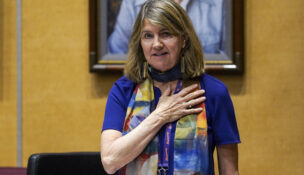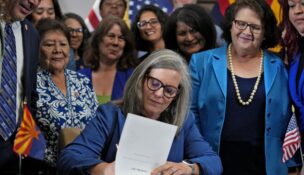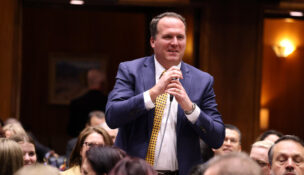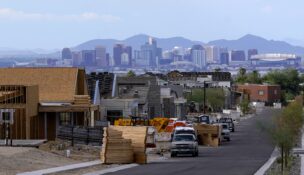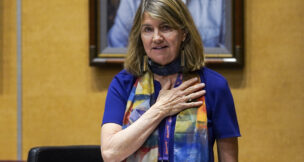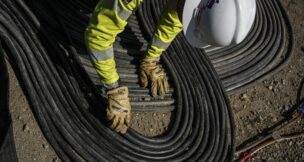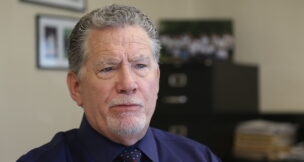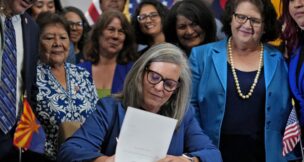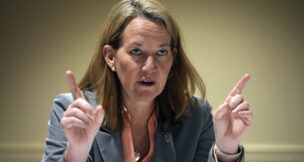Senate president calls for Friday ballot deadline, critics warn of voter disenfranchisement
Howard Fischer, Capitol Media Services//November 9, 2024//
Senate president calls for Friday ballot deadline, critics warn of voter disenfranchisement
Howard Fischer, Capitol Media Services//November 9, 2024//
Want quicker election results?
Senate President Warren Petersen says the answer is simple: Forbid voters from dropping off their early ballots on Election Day at polling places.
That, he said, is the way they do it in Florida. And he wants to introduce legislation this coming session to make it happen here.
But Secretary of State Adrian Fontes said there are “other systemic problems” that contribute to the fact that it takes days to get a final tally. And he said that shortening the time voters have to return their ballots is not then answer.
“I don’t like any solution that limits access,” Fontes said.
“I don’t like any solution that narrows the ability for voters to vote the way they want, when they want,” he said. “I’m not a fan of doing this on the backs of voters.”
Gabriella Cazares Kelly, the Pima County recorder, agrees.
She said the window for early voting is already small enough. And that window is even smaller than the 27 days that the calendar provides, what with the time it can take the post office to get the ballots from county offices to the voters.
Then there’s the delays in returns through the U.S. Postal Service which she said can take up to five days. And, unlike some states where it is the postmark that counts, any ballot not in the hands of the county by 7 p.m. on Election Day just doesn’t get counted.
But Stephen Richer, her Maricopa County counterpart, has thrown his support behind a proposal to say that early ballots can be dropped off at county offices or voting centers only until 7 p.m. on the Friday prior to the election. And given that early ballots now make up close to 90% of all ballots cast, he said that earlier deadline could mean the state would have 95% of the results within the first 24 hours.
Still, he acknowledged that this would mean inconvenience for some.
“Many Arizonans have been voting by ‘late early ballots’ for many years and could be surprised, confused and angered by a prohibition of this practice,” Richer said in a position paper on election issues.
All this comes as reports Thursday afternoon showed that while more than 2.5 million ballots already have been tabulated, there are close to another 953,000 that are uncounted.
Not surprisingly, the biggest share of that is in Maricopa County, with about 584,000, with another 175,000 in Pima County.
But even small counties are still processing, with Yavapai County showing close to 60,000 yet to be tallied compared with about 95,000 already tabulated.
At the heart of the problem, said Petersen, is voter confusion and consternation about why other states seem to be able to call their races the night of the election while in Arizona several remain undecided. These include not just the high-profile contest for the U.S. Senate between Ruben Gallego and Kari Lake – he was leading by about 50,000 late Thursday – but also who will win in several legislative districts, with the outcome determining whether Republicans will retain control of the House and Senate.
Fontes, however, said there’s another thing to consider if the state were to prohibit people from dropping off their early ballots after Friday night.
He said that, for whatever reason, some people do want to wait until the last minute. That deadline, he said, will mean that all those people now will have to stand in line to vote in person, whether at emergency vote centers on Saturday, Sunday and Monday – and not all counties have such an option – or turn out on Election Day, adding to the already long lines.
“It’s going to have to take them that much longer,” said Fontes.
Richer acknowledged that in 2022, about 290,000 people turned in their early ballots on Election Day.
Now, they simply go in to a polling place, drop their envelopes in a box, and leave. Fontes said these are the people who, if this plan were enacted, would instead have to wait in line to check in, provide their identification and then fill out a ballot.
“And you’re going to have to have more polling places, more equipment,” he continued. “And I’m talking about tables and extension cords and facilities which are hard enough to get. And then people to work in all those facilities.”
But Richer said Florida, which has a larger population than Arizona, shows the process can work.
There, voters can return early ballots on Election Day – but only to the central election office.
“But they cannot drop off early ballots at the voting locations,” he said.
“As a result of this limitation, the largest county in Florida (Miami-Dade) had approximately 4,400 early ballots dropped off on Election Day,” Richer said. That compares with the 290,00 in Maricopa County.
Petersen said voters in the Sunshine State manage to live with the restriction.
“There’s not revolts and riots there,” he said.
Anyway, Petersen said, it’s not like Arizonans don’t understand deadlines.
“You know that you’ve got to have your ballot mailed in Tuesday” to ensure that it is in the hands of election officials by 7 p.m. on Election Day. Postmarks don’t count.
“Everybody seems to have accepted that,” he said.
All this would to, said Petersen, is create a 7 p.m. Friday deadline to drop off an early ballot.
“And then, after that, I’ve got to vote in person,” said the Senate president.”Why is that an issue?”
What’s an issue, said Fontes, is what is the trade-off. He said if lawmakers want to go down that path, then they need to ensure there is greater accessibility than there is now for in-person voting on the Saturday, Sunday and Monday before the election rather than making those affected stand in line on Election Day.
That isn’t the case now.
Cazares Kelly said there are only 18 early voting centers in Pima County. That compares with 126 open on Election Day.
And Maricopa County has its centers open only on the Saturday and Monday before the election, with Sundays not an option.
Petersen said getting earlier results would take care of another problem.
“You have a lot of people that this is breeding mistrust,” he said. “They feel like since we don’t have the results, something is going on.”
That reasoning leaves Fontes cold.
“They’ve got to stop believing in conspiracy theories,” he said. Fontes said the process this year, when he will certify that Donald Trump won the state’s 11 electoral votes, as it was four years ago when he lost to Joe Biden, the year that led to demonstrations and accusations of election fraud and even an audit ordered by the Senate that, in the end, confirmed that Biden outpolled Trump.
“I’m happy to have a conversation with anyone,” Fontes said.
“But if it’s going to be a conversation with anyone that’s pounding their fists on the table, screaming ‘Stop the steal,’ then it’s futile,” he said. “There’s no reason to have that conversation because that person isn’t going to come to this in good faith and they’re not going to have a reasonable conversation.”
Petersen acknowledged that the issue goes beyond those who suspect something sinister. He said many people don’t understand why things don’t happen instantaneously.
“You order something on Amazon, take a shower, and it’s at your door when you get out of the shower,” Petersen said.
“They want to know ‘why are we waiting?’ ” he said. “The question is, why should we wait?”
Fontes acknowledged it might be a “matter of preference” to have earlier returns.
“Now, if that’s going to be a major priority, that’s not a hard problem to solve,” he said.
He said much of the problem is in Maricopa County.
“They need a warehouse or two and a giant pile of people, maybe three or four times the number that they’re using now, and they can process those ballots much, much more quickly,” Fontes said. And he said there are other “systemic issues” that contribute to the amount of time it takes to get a final vote tally.
“But I wouldn’t solve it on the backs of voters,” Fontes said.
Even if Petersen can get such a change through the Legislature, that still would not make it law.
It would have to gain the signature of Gov. Katie Hobbs who had the job that Fontes occupies. And press aide Christian Slater said she doesn’t see the need.
“As the state’s former chief elections officer, Gov. Hobbs opposes any proposal to restrict Arizonans’ freedom to make their voices heard at the ballot box,” Slater said. “She remains committed to a voting process that maintains accessibility and integrity for all Arizona voters and guarantees safe, secure and fair elections.”
That opposition from the governor already was anticipated.
A similar plan for a Friday deadline to drop off early ballots was approved earlier this year by the Senate Government Committee – not as legislation but instead as a plan to send it to the ballot. But the proposal did not survive the legislative process.

